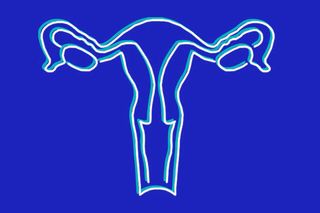
For Many, a PCOS Diagnosis Only Brings More Confusion
Prerna Sharma works long hours at one of Mumbai’s most popular hair salons. As she begins another work day of cutting, colouring and styling her clients’ hair, she tells me about her experience of being diagnosed w...

Prerna Sharma works long hours at one of Mumbai’s most popular hair salons. As she begins another work day of cutting, colouring and styling her clients’ hair, she tells me about her experience of being diagnosed with polycystic ovary syndrome.
“I’ve been to three to four gynaecologists, and they all say, ‘It happens,’” says the 28-year-old. Sharma was diagnosed with ‘it’ – polycystic ovary syndrome, or, PCOS – 14 years ago. “There is no clarity in terms of how to deal with it or how to get rid of it.”
PCOS is a disorder characterized by imbalanced hormones, which can lead to ovarian cysts, irregular, painful or heavy periods, along with facial acne or hair growth, and rapid weight gain. It was first identified in 1935 by doctors Freiler Stein and Michael Leventhal, and has since been linked to other conditions like diabetes, thyroid disorders, heart disease and obesity. Resulting from a mix of genetic propensity and lifestyle decisions, it affects a startling 1 in every 4 to 5 Indian women of childbearing age, according to estimates by the Department of Endocrinology and Metabolism, AIIMS.
But despite how long and how widely it’s been around, little is known about the condition’s root cause; there is no preventive care and no cure for PCOS.
PCOS “is not something you can remove from the body and cure,” says Dr Suchitra Dalvie, a gynaecologist. “It’s a metabolic disorder and you can only control it, never cure it completely. Once your body has manifested it, you’re likely to live with it your entire life. I think that’s what intimidates people.”
Figuring it out for yourself
For Sharma, it wasn’t the prospect of long-term management that was intimidating; rather, it was the lack of understanding and options. Sharma religiously followed the treatment given to her for seven years – contraceptive pills to regularize periods, even when the tablets made her ill.
“I told my gynaecologist that the medicines made me sick. She said if it’s not working out, I should leave it completely,” says Sharma, who was confused by the 180-degree advice. “If the pill doesn’t suit you, there has to be something else that you can do!”
Lovleen Malhotra also visited a few doctors, coming away with little more than a name for her condition and advice to lose weight, often a doctor’s first step in treatment for women with PCOS.
“Weight loss has been one of my major issues. I would lose 2 kgs and put it back, so felt like giving up,” says Malhotra. “Especially when I was not being able to lose weight because I was not able to correctly understand what [PCOS] is.”
So instead of relying on doctors, she turned to the Internet and her friend circle for information, finding that the same hormones that affect menstruation and ovulation in women with PCOS are also involved in regulating weight; the imbalance makes it difficult to lose weight, even if symptoms (in theory) become more manageable at a lower weight.
“I had to find out for myself – searched on Google and through my friends who had this disease. I realised that I did not have proper gyaenocologists before 2014 to give me proper advice,” Malhotra remembers.
It was only when she was diagnosed with a thyroid condition, too – a common co-condition to PCOS — that she understood why she was not able to manage.
Is PCOS even really PCOS?
Sharma and Malhotra’s experiences highlight a gap between medical advice and women’s lived experience when it comes to PCOS, a gap rooted, perhaps, in the very broad medical definition of the condition. In reality, however, PCOS is a highly individualized disorder.
“PCOS has variations of physical manifestations,” says Dr Duru Shah. “And every woman is different – there’s no one treatment for everybody, and unless I get a conclusive diagnosis of what I’m dealing with, I can’t provide a relevant treatment.”
But “conclusive diagnosis” is not easy in PCOS, given the generic nature of its symptoms (for example, an acne breakout) and the breadth of its related conditions. This is leading some researchers to question the current definition of PCOS and consequently, how it should be treated.
Australian researchers, in a recent opinion piece in the British Medical Journal, have critiqued the expansive definition of PCOS, saying it has led to overdiagnosis and caused patients to undergo unnecessary and, in some cases, harmful treatment. In 2003, after the definition was broadened to include polycystic ovaries detectable by sonography – a move perhaps intended to make diagnosis more exact — there was a sudden, fourfold jump in cases, from 5% to 21% of women of reproductive age worldwide.
Tess Copp, one of the writers of the piece, says in an interview to The Sunday Morning Herald, that many women were “given a lifelong disease label” when symptoms like acne and irregular periods simply overlapped with symptoms of puberty. The paper recommends treating women’s symptoms one at a time, rather than diagnosing PCOS and treating symptoms that may not have manifested and maybe never will.
Treatment: Means to a questionable end
The experience of having a highly individualized condition treated with broad brushstrokes leaves women like Sharma and Malhotra in confusion. Additionally, their efforts to take control of their health are hampered by the social norms that impact communication with practitioners — which mean medical advice often isn’t geared toward healthy management, but toward maximizing fertility (or is, at least, communicated, in those terms).
“The first thing she [the gynaecologist] told me was that I need to lose weight, my lifestyle needs to be perfect, because if I don’t do this, then I will have problems in conceiving,” Malhotra recalls.
Similarly, when I was diagnosed with PCOS at age 22, over a decade ago, the gynaecologist, an experienced female doctor, immediately suggested I get married, have kids and be “cured.”
In fairness, the elevated levels of certain reproductive hormones that characterize PCOS can, in some cases, affect a woman’s fertility. But the communication of a socially conditioned medical establishment, operating under a definition of PCOS too broad to show a clear, individualized path to health, has led to the mistaken belief that PCOS causes infertility. The more accurate term, in fact, is ‘subfertility,’ a general, reduced fertility compared to the average; infertility carries connotations of sterility –a different thing altogether, according to experts.
The psychological toll
Copp et al’s paper also included a call for greater consideration of the psychological effects of living with PCOS. Receiving generalized treatment for an individualized condition and labouring under the mistaken stigma of infertility, women with PCOS are having to take decisions that profoundly affect their health, personal and professional lives, based on an often incomplete (or over-generalized) picture of their condition. And even when health improves, quality of life often suffers.
For Malhotra, an impending arranged marriage meant weight loss to minimize the perception of infertility and risk of subfertility. She quit her job to concentrate on her health — an extreme step for managing a disorder that is not life threatening, but one she says was worth it.
“I also wanted to get rid of the symptoms to be able to get married and not keep my future partner in the dark about my condition,” she says.
For many women with PCOS, however, the reverse might be more accurate: Not wanting to keep a future partner in the dark about PCOS means getting rid of symptoms. According to Dr Dalvie, the stigma attached to side effects of the syndrome – like subfertility or weight gain – is because of the patriarchal notion “that girls have to be marriageable and being marriageable includes being able to prove your fertility.” For many living with PCOS in a patriarchal society, PCOS becomes more about being marriageable than being healthy.
Muddling a way forward
In a study conducted by Gauri Pathak, assistant professor at Aarhus University, Denmark, the professional status and identity of women in the workforce, who perhaps are susceptible to PCOS because of the same stressful working conditions and poor eating habits, also allows them to delay their roles as mothers or wives. Their economic independence ensures they can afford to pay for treatment of symptoms like subfertility at a later stage. As more Indian women move into the urban, employed, middle class, their management of the condition will be more empowered.
Assuming, of course, they are receiving sound medical guidance. Dr Duru Shah, founder and president of the PCOS Society and member of an international advisory panel convened by the Centre for Research Excellence (CRE) in Polycystic Ovary Syndrome, says greater research into PCOS is currently underway and by June 2018, the panel aims to bring out a list of guidelines on a number of areas surrounding PCOS. This includes screening, diagnostic assessment, risk assessment, lifestyle management, emotional management, medical treatment, and the screening, diagnosis and management of infertility.
Noticeably absent in these efforts is anything related to support groups, or advocacy for awareness and education. Until we get that, women will continue to muddle through on their own, or perhaps with the help of a circle of friends who have the same disorder. Sharma seems resigned to this.
“It’s become a part of life now,” she says matter-of-factly. “Even [while] talking about it to other people who have it [PCOS], everybody just has a very casual approach. We have it and there’s nothing else to do about it.”
Pooja Das Sarkar is a filmmaker and writer who is passionate about gender, cinema and development communication. She started her career as a reporter for The Telegraph and Time Out magazine and has been a correspondent for the popular social issues-based TV show Satyamev Jayate. She runs her own creative agency in Mumbai and is the founder of the online platform, Filmwali, dedicated to documenting the work, life and representation of women in Indian cinema. Pooja holds a Master’s degree in media and cultural studies from Tata Institute of Social Sciences.
Related


Is a Loneliness Minister Really Necessary? Yes, Actually.
